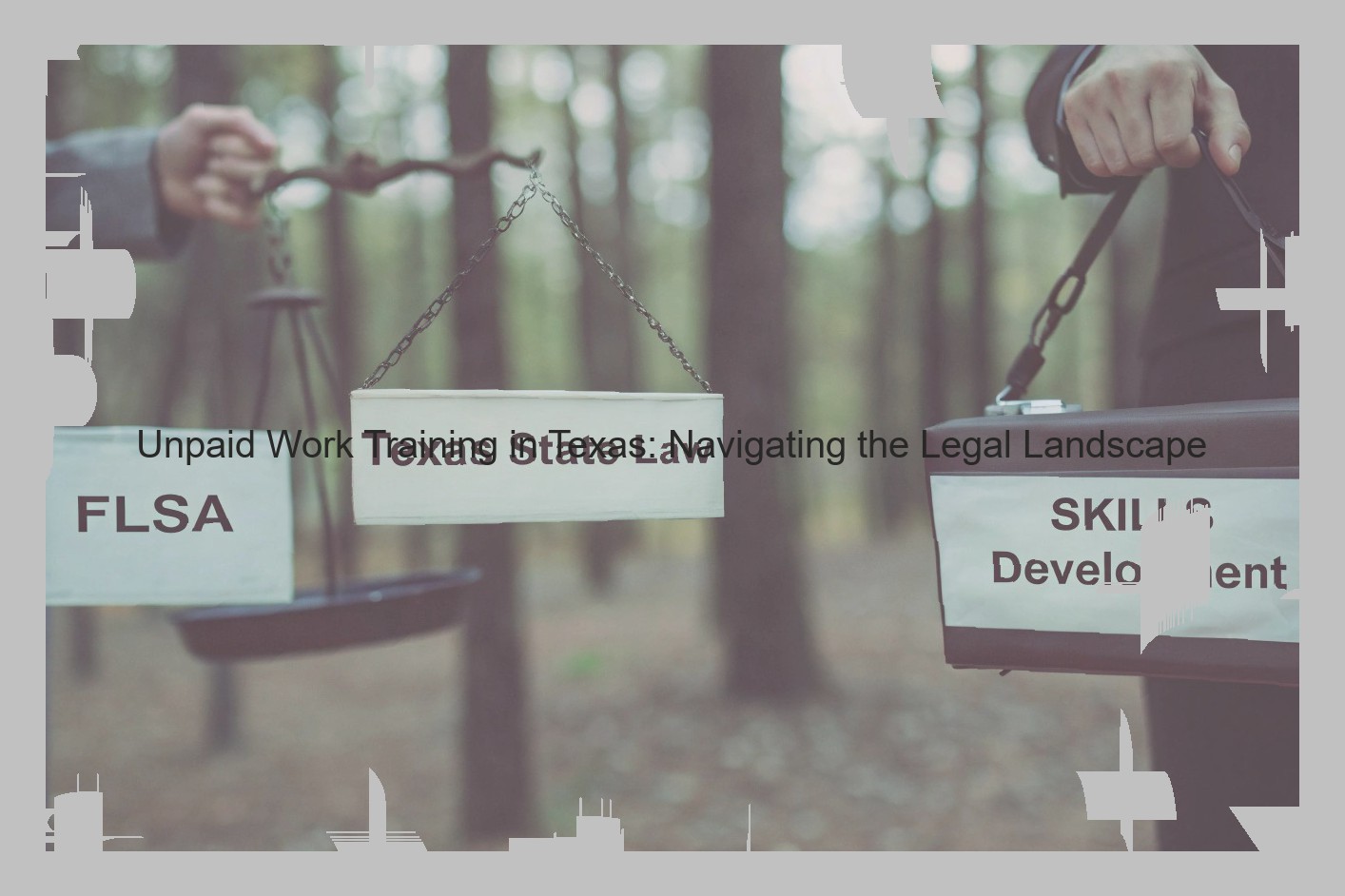What Training is Unpaid?
Unpaid training is a term used to refer to a situation where employees perform services for a prospective employer, prior to the employer offering the workers employment, and without pay. This "training" can take many forms, including:
- On-the-job instruction by a supervisor;
- Mock sales pitches;
- Product demonstrations;
- Testing, through which the person has to show that they are capable of performing the job properly; and
- Classroom instruction, including simulations and lectures.
Employers use this form of unpaid labor for various reasons. From the perspective of a company looking to offset costs, nothing makes better sense than to obtain services from employees without having to compensate them. Also, training new employees can be expensive, and ideally employers do not want to pay for training unless they intend to keep an employee for the long term.
Unpaid training programs can save employers and businesses thousands of dollars a year, something that has proven to be attractive to hard-hit employers. In particular , in this economy, employers have looked to unpaid training as a way to save money on onboarding new hires and/or provide additional experience and work to current employees. However, while business may benefit from having unpaid trainees, it does not necessarily follow that employees will benefit. Employees performing unpaid labor as part of a training program (as opposed to volunteering for their community) often become frustrated and disappointed with their experience, as such programs can provide only limited instruction, and do little more than act as a cover for free labor. In turn (and possibly because of their experience with the unpaid training program) they may find it harder to get the jobs they want.
While unpaid training programs can, and often do, act as a bridge for workers to find the job they desire, not all programs operate fairly, and in some instances, employers abuse these programs by exploiting workers, foregoing their duties to train, and reaping the benefits of unpaid labor for little to no cost.

Federal Law – Fair Labor Standards Act
The Fair Labor Standards Act ("FLSA") is the federal law that governs minimum wage and overtime payments, and applies to employers in Texas. FLSA Section 203(g) defines "employer" as: … any person acting directly or indirectly in the interest of an employer in relation to an employee. Under the FLSA, and similar to Texas law, "employee" is broadly defined to include any individual engaged in commerce or in the production of goods for commerce. The United States Secretary of Labor has issued a set of regulations elucidating the definition of the terms in FLSA Section 203(g), including the term "trainee." The regulations state, in pertinent part: General.—An employee of such an enterprise is not considered to have worked for a fixed period of time or for a given amount of production or sales, for example, from 8:00 a.m. to 5:00 p.m. or produces 1,000 widgets or sells $1,000 worth of merchandise, so the question of whether he is an employee as described in the FLSA is not one which can be resolved in such a manner. For these reasons it is understood that many cases under the FLSA turn on the presence or absence of particular factors indicating the presence or absence of an employment relationship (e.g.,) whether the work is done in a factory or field; under supervision or control (with recognized exceptions); with the required degree of skills. The determination is consequently simple or difficult depending on the fact situation presented, the legal relationship shown and balance of the various indicia of the employment relationship presented. No one factor as a matter of law is necessarily dispositive of the question. The text and legislative history of the act suggest that it would be appropriate to give weight to the background of the regulation, the statutory history and purpose and other factors which are useful in statutory interpretation of the act. 29 CFR § 779.103(a) (as amended May 5, 1983). Importantly, the regulations also include several factors which indicate that individuals are not employees, specifically: …(2) individuals offered the opportunity to work for their own advantage and profit in indoor employment for a fixed period of time at a salary or rate of earnings based on values placed by them on the services performed, rather than at a rate established or approved by the employer; (3) students in practice and apprentice schools subject to State and Federal laws and regulations under circumstances which indicate, under the principles set forth in this part, that no employment relationship exists; (4) members of an established or traditional program, such as on-the-job training programs or apprenticeships and farm finders, are not considered employees so long as the established factors are met and so long as the program is not merely a method to avoid the FLSA’s provisions. 29 CFR § 779.103(a)(2), (3), (4). The regulations also state that "[n]one of the facts, standing alone, are necessarily or per se determinative that an employee is or is not employed or permitted to work (29 CFR § 779.103(a))." Therefore, several factors must be evaluated to determine liability under the FLSA. Those factors include whether the trainees receive training closely related to their educational goals; whether they are closely supervised; whether the trainees can immediately find comparable work (of similar type and at similar skill); whether the trainees receive course credit; and whether the trainees expect the training to result in a job. 29 CFR § 779.103(b)(1), (7), (8), (9), (10).
Texas State Law
In Texas, the regulations concerning unpaid training periods are aligned with federal regulations under the Fair Labor Standards Act. The Texas Workforce Commission does, however, provide guidance as to how the FLSA is to be applied to officers and managers in the retail and service industries. The FLSA provides that you do not have to pay apprentices and trainees for their periods of "vocational training," where they are "simply [given] an opportunity to work under the close observation of experienced personnel." 29 C.F.R. § 779.214(a). The TWC solves the definitional problem of what constitutes "vocational training" within the context of the FLSA in the context of employees within the "retail and service industries." An employee is "generally exempt from minimum wage and overtime requirements" under the FLSA if they are in a "formal" training program. 29 C.F.R. § 779.214(b). Such "formal" programs tend to have a structured curriculum and preestablished time frames, as well as a designated school to which trainees may return "in case of temporary interruptions." Id. "Informal" training programs that are "less systematic in structure" do not qualify for the exemptions. Id. The TWC instructs that "employers should not mischaracterize informally trained employees as ‘trainees’ or apprentices to avoid payment of minimum wage and overtime." Id. The factors that help determine whether an employee is in a formal or informal training are the structure and scope of the training program, the relationship of the training program to the employee’s job duties, and the relationship of the training program to the overall business objectives of the company. Id. Further, the FLSA defines basic guidelines for certification of apprenticeship programs. 29 C.F.R. § 30.1. Apprentices must be registered with the U.S. Department of Labor and may participate in "apprenticeship training programs involving minimum wages no less than the minimum wage rates applicable under the [FLSA], the regulations and orders of the [DOL], and the regulations of the state apprenticeship agency." 29 C.F.R. § 177.712(c). So-called "trainees" must be paid 60% of the required wage rate paid to a fully qualified worker; 70% after six months; then 80% for the remaining 6 months. DOL Website, Wage and Hour Guide To Wage Payments (anonymous publication on the Dol.gov website).
Potential Legal Issues for Employers
Employers run the risk of paying employees up to three years in backpay, liquidated damages, and attorney’s fees to employees who contend that they performed work when they should have been paid minimum wage in this type of scenario. These claims are brought under the Fair Labor Standards Act, 29 U.S.C. § 201, and Texas Minimum Wage Act, § 61.011 of the Labor Code.
The Texas Workforce Commission (TWC) recently updated their guidance on their website to include very limited exemptions and present a narrow view of unpaid training. The TWC provides that a student who performs SCA services for an SCA company, but does not receive a salary or hourly wage should not be compensated. This scenario is only applicable when the training of the student is structured to benefit the student, and the student learns valuable job skills. In their example, the TWC considers unpaid training experiences provided by doctors, lawyers, accountants, etc. Additionally, when the student is subject to supervision of a qualified person and learns specific tasks necessary to the field wherein he/she will be employed (doctors learning skills to be later employed at a hospital, attorneys learning specific legal skills to be later employed at a law firm, etc.).
If a company chooses not to compensate an employee for periods where the employee has performed work, and this work is found to be compensable, the company may be responsible for paying wages at one and a half times the normal rate for any hours worked over forty per week, retroactive to the beginning of the unpaid work and for three years into the past, as calculated by the TWC. Additionally, the employee can be compensated for two years of liquidated damages (monetary compensation for the damage done to the employee if they were paid at or above minimum wage) and attorney’s fees. These penalties can add up to a significant sum, and the backpay will also be subject to interest.
Many employers make the mistake of training employees under the premise that they are unpaid trainees and therefore do not need to keep track of their hours. This is an incorrect assumption and could lead to serious penalties for the employer. A careful look into the legal requirements of unpaid or partially compensated internships and/or traineeships should always be made before implementation. Current guidance provided by the United States Department of Labor outlines six factors employers should consider:
If there is doubt about whether an individual working for an employer is a "trainee" or "intern" instead of an employee, whether the work performed is of a "training and learning nature" or "compensable work," or whether the employer must issue wages, the employer should err on the side of paying the employee instead of risking a claim.
Rights and Protections for Trainees
To protect against unfair treatment or exploitation during unpaid training in Texas, trainees have several rights and protections:
These laws provide a framework within which covered employers must operate and provide some guidance on what sort of compensation a trainee is entitled to receive for unpaid training. However, they do not clearly set forth what happens to a trainee who is maliciously or purposefully exploited by an employer under the guise of unpaid training. Much of this question will ultimately be left for a court or jury to answer if a trainee makes a claim that their rights under the FLSA or state law have been violated.
If the trainee has met the above requirements and believes their unpaid training period has been converted into unpaid "employment" , they should contact an attorney immediately after the end of the training period. Depending on the length of the unpaid training period, the statute of limitations for violation of wage payment laws can be as short as 60 days or as long as four years and thus an attorney’s assistance in deciding what steps should be taken is invaluable.
Employers’ Best Practice Considerations
Employers should take several steps to ensure that their training programs comply with state and federal wage and hour law when legally unpaid training is desired by the organization. First, employers should consult with counsel to determine which training programs may be offered on an unpaid basis. Counsel should review the specific training program to determine if it meets the criteria necessary to qualify as unpaid in Texas and federal law.
For example, employers should consider whether their apprenticeship or internship program would be considered a bona fide educational program. If a program does not pass muster under state or federal law, then the employer should consider making the program paid, even if it is a limited duration training program, to reduce the risk of misclassification.
Second, it is recommended that organizations elect to provide a written agreement to the unpaid trainees before the training begins. The written agreement should have clear notations as to the mutual understanding between the trainee and the employer that the training will be unpaid, as well as a statement of voluntary participation. It is also advisable to have the trainee acknowledge that the decision to participate in unpaid training is free from any coercive impact by the employer.
Third, employers should ensure that employees are told that the program is unpaid, and employers should refrain from requiring or asking trainees to perform work during the course of the unpaid training program. Employers should also take steps to avoid the risk of allegations that trainees were coerced into accepting unpaid training by informing trainees of their rights under the Fair Labor Standards Act (FLSA).
Fourth, if the employer uses current employees in the unpaid training program, the employer should ensure that it has trained existing employees that the purpose of the training program is exclusively educational in nature. Existing employees designated as unpaid trainers for the program should also be trained about the legal requirements for voluntary participation in an unpaid trainee program and the need to maintain the distinct separation between training and employ.
Finally, the employer should monitor the training sessions closely to ensure that they comply with state and federal law. Periodic follow ups, including surveys, can help the employer determine whether the training is effective and to identify areas for improvement.
Conclusion: Educated Choices
In this article, we have explored the nuances of unpaid training in Texas. From understanding the legal framework of the Fair Labor Standards Act (FLSA) and Texas Payday Law to navigating the specific conditions under which unpaid training is permissible, both employers and trainees must be aware of their rights and obligations to prevent potential legal pitfalls. For employers, establishing clear protocols for unpaid training programs can help mitigate the risk of noncompliance. Precise guidelines about the nature of training, the level of supervision provided, and the overall benefit to the participant as compared to the employer are vital. It’s also essential to maintain a record of communications with participants , especially when the program is intended to assess their long-term fit for the company. Trainees should also be proactive about protecting themselves from exploitation. Knowledge of local and state labor laws is the first line of defense. If you feel uncertain about whether your training qualifies for an unpaid arrangement, seek clarification and, when necessary, legal counsel before proceeding. Questions such as whether the training is primarily for the benefit of the trainee, whether the type of training provided is customary in your industry, and whether the trainee is performing productive work should all guide your decision-making process. Both parties stand to gain from a transparent and well-structured training program. Training serves as a powerful tool for skill development, team building, and ultimately, workplace efficiency. However, diligence in complying with legal requisites will ensure that your training program not only meets your business or personal goals but also adheres to the law.



